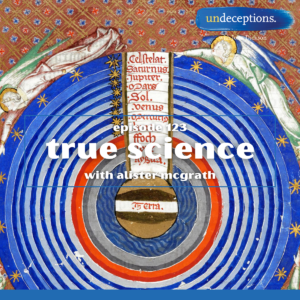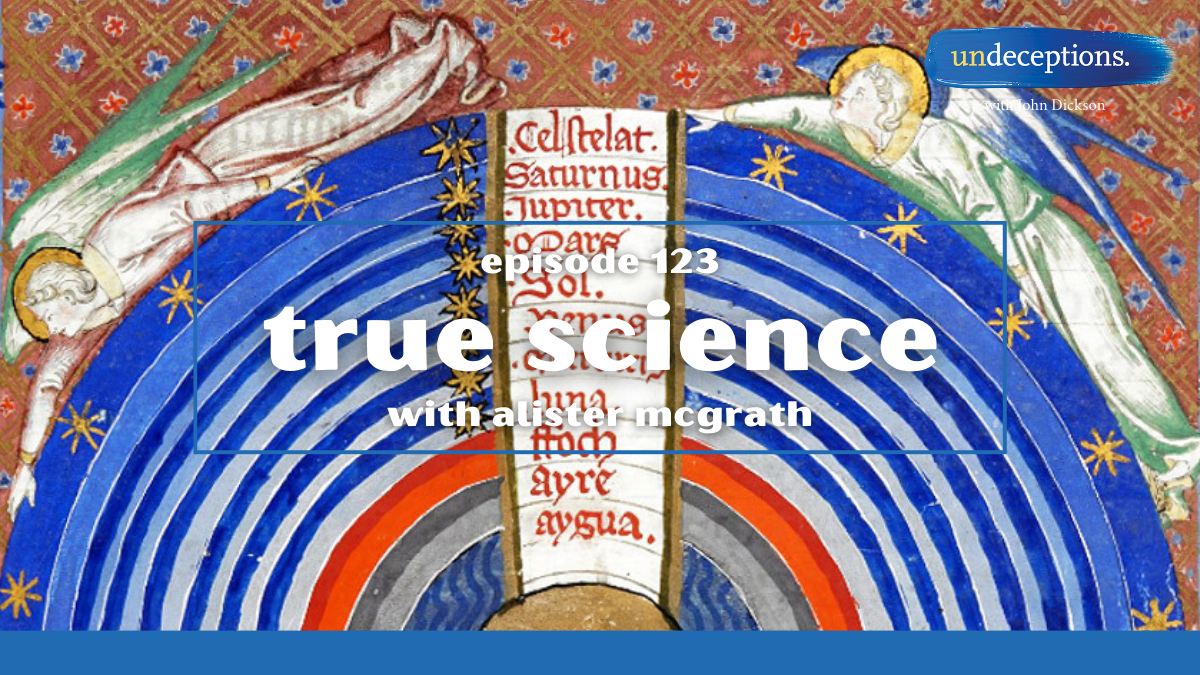
Before science fragmented into individual disciplines, there was Natural Philosophy.
What can we learn from this ancient, mysterious tradition?
Meet our guests

Emeritus Professor Alister E. McGrath is a returning guest at Undeceptions. Having recently retired from his post as the Andreas Idreos Professor of Science and Religion at the University of Oxford, he now enjoys the life of a full-time writer (while enjoying all the resources of a celebrated Oxford Professor). Having initially worked in the world of natural sciences, McGrath turned to the study of theology and intellectual history, while occasionally becoming engaged in broader cultural debates about the rationality and relevance of the Christian faith.
Links
Special thanks to our season sponsor Zondervan Academic. Get discounts on MasterLectures video courses and exclusive samples of their books at zondervanacademic.com/undeceptions
Check out Alister’s academic page on the Oxford website – including links to some of his published work – here.
A transcript of this episode is available here. Please note, that due to software not all exchanges between guests will be completely accurate.
Extras
Check out these helpful links below for more info on what was discussed in this episode.
To Read
- Andrea Wulf’s guest essay for the New York Times on Friedrich Schelling is a great introduction to how Natural Philosophers saw – and taught about – the world. Here is it
- This article written in the 80s to commemorate 300 years of Newton’s Principia is also a great explainer of the impact of this work of Natural Philosophy
- The Islamic Golden Age (8th – 13th centuries) saw enormous advances in Natural Philosophy – loads of which came out of Baghdad. Here’s a great explainer of that period
- Philosopher David Benatar has quite sensationally made the case that it would have been better for humans not to have been born! While we obviously disagree, here’s an interview he did with The New Yorker that unpacks this rather drastic view
- The correlation between the beauty of theories and their accuracy is a fascinating area of discussion. Here’s a paper in American Scientist that goes into it ($)
To Watch
- Like many things, Natural Philosophy can be traced back to Ancient Greece (at least), especially to the works of Plato and Aristotle. Here’s a good exaplainer on who those men were
- The Kepler Telescope – named after the Natural Philosopher Johannes Kepler – has helped us see deeper into space. Check out this amazing video on some of the discoveries it made
- Ever wondered what studying at a medieval university would be like? This video helps shed some light on it
- Nobel Laureate Sir Roger Penrose is just one of Alister’s very cool friends – here he is on the Joe Rogan Experience, talking all things science and philosophy
- Burden of Dreams has become a cult classic among Herzog fans. Check out this amazing clip from the movie – but be warned, he doesn’t have the nicest view of nature!
To Listen
- Our episode on the Venerable Bede is a great companion piece for today’s episode. Check it out here
- So too is our episode ‘Beautiful Science’ – here it is
- Alister McGrath has also been on the show before! Here’s his first outing – ‘Scientific Theology’
- Here’s Alister talking about how he became a Christian, from the world of science
… and finally
- A huge shout out to Sydney’s death metal crew Lo! for letting us use their song in this episode. Buy a copy of their latest record The Gleaners (Pleaglic Records) here

Undeceptions Plus offers exclusive bonus content to members. By becoming an Undeceiver, you can unlock uncut interviews, extra question and answer sessions, and peeks behind our creative process as we put the shows together. We’d love to have you with us.












































